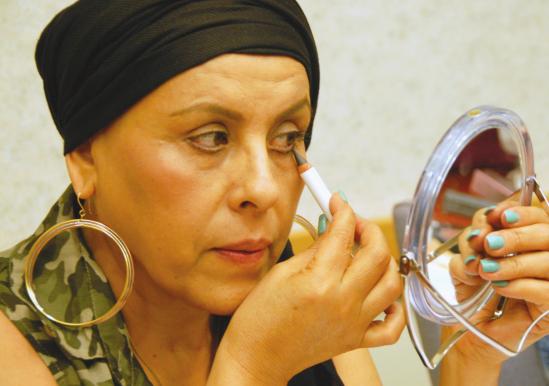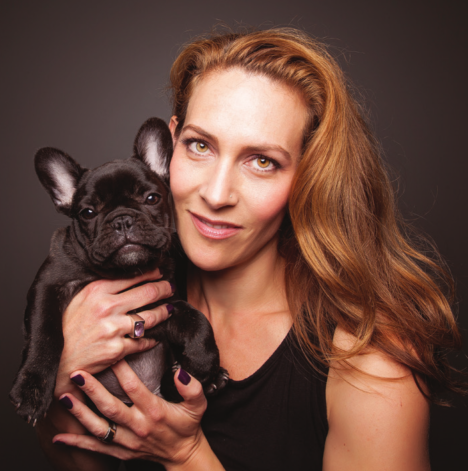Cancer Coping
Jan. 8, 2016

Venus Beauty Lounge offers wigs, makeup for recovering patients
Susan Ruoff closed her high-end cosmetics store, Venus, in downtown Traverse City near the end of 2015, but that doesn’t mean the extensively trained stylist won’t still be helping women feel beautiful. Ruoff simply has a new focus: women living with cancer.
Ruoff completed her training as an instructor with the American Cancer Society’s campaign “Look Good, Feel Better” in October. She teaches her first class this month.
“It’s so cool,” she said. “I have a good friend who went through the class — we are the same age, went through pregnancy together; we’ve been through a lot together — and is the reason I started.”
Her friend had been progressively losing hair and generally not feeling well from the effects of cancer treatment, but they met for lunch one day “and she looked beautiful,” Ruoff said.

She asked what brought about the dramatic turn-around in her friend’s appearance and learned it was “Look Good, Feel Better.”
Ruoff said she had seen advertisements for the non-medical cancer program seeking cosmetic stylists to participate. Seeing the program’s impact literally on the face of her friend, Ruoff said she was instantly sold on the concept and couldn’t wait to get started.
“It’s not very often you really get to touch someone’s life. This is why I do this job. I have a lot more to offer than just being in retail or a boutique owner,” she said.
WHY THE CAMPAIGN EXISTS
Denise Dunn is the American Cancer Society’s regional program manager for mission delivery across northern Michigan. She became involved in the national nonprofit organization after her aunt underwent cancer treatment.
“There were no programs like this then for her,” Dunn said.
The “Look Good, Feel Better” campaign is different than many of the other services sponsored by the American Cancer Society, she said. It is different than providing patients free transportation to medical facilities or arranging hotel accommodations for those who live far away from their hospital.
“It’s not about her cancer, but who she is,” Dunn said. “It’s to help women deal with the side-effects of cancer.”
Rather than focusing on medical care, it’s devoted to helping women cope with the outward changes to their appearance while they progress through potentially life-saving treatments.
“And all treatments are not the same. How their body receives and reacts to their treatment comes in as many ways as we are women,” Dunn said.
Some women undergoing chemotherapy or radiation treatments for cancer will lose all the hair on their bodies, while others might notice their eyelashes and eyebrows are simply missing one day. Long, beautiful locks might start to fall out in chunks. Whatever comes, the experience can be emotionally traumatic for women, on top of their already physically burdensome medical diagnosis and treatment plan.
“This offers another way for women to get together in a comfortable, safe environment to talk about their experiences,” Dunn said.
Then, participants get to play with makeup — really nice makeup.
HOW THE PROGRAM WORKS
Ruoff will volunteer her time to teach “Look Good, Feel Better” classes. Even as a licensed cosmetologist, she completed specific training in order to participate.
“Cancer patients can be referred to me anytime, but the class is only taught once a month,” she said.
Participants learn skin care and beauty techniques to combat their changed appearances.
The program first launched in 1989 when the American Cancer Society partnered with the Personal Care Products Council, a cosmetics and perfume industry lobbying group.
“Each participant or patient will get a makeup kit with up to $300 worth of brandnew makeup,” Ruoff said.
Cancer patients pay nothing to participate in the program and various cosmetics companies donate products to the effort.
“The American Cancer Society will even provide one free wig,” Ruoff said.
The free wigs come from another program the nonprofit operates. How to style wigs and wear various scarves and shawls, though, are part of the cancer-coping lessons, she said.
Dunn agreed the use of wigs or wearing scarves as turbans can be immensely helpful for cancer patients who lose their hair. She said an example is when a woman with long hair suddenly doesn’t have any.
“Her neck will feel naked,” Dunn said. Many of the natural, human hair wigs distributed by the American Cancer Society in northern Michigan come from the Pantene Beautiful Lengths program, Dunn said. She added that the program is a great way people with long hair can donate their locks with a guarantee it will benefit a woman cancer patient.
“It comes back in the form of a beautiful wig that we donate to a wig bank,” Dunn said, some of which can be found in Traverse City, Cadillac, Grayling and Petoskey.
The “Look Good, Feel Better” program also attracts some women who may have never worn makeup and now want to learn how to apply cosmetics as an adult. Dunn said others might be well versed in facial makeup application and be able to share their abilities with other participants, while also learning special techniques to create missing eyebrows or eyelashes. “Eyebrows give expression to your face. They make a difference,” she said.
HOW TO GET INVOLVED
Anyone who wishes to participate in this free American Cancer Society program can register by calling (800) 227-2345.
“Anybody, anywhere across the United States can call that number and find out more and register,” Dunn said.
Oftentimes, participants are referred to the program by their oncologists, she said, but they can directly contact the nonprofit for themselves or on behalf of others. Callers can inquire about this program or other programs, such as wig bank referral.
Additionally, “Look Good, Feel Better” participants are not required to take the class in the location where they receive medical treatments. If there is a class location closer to home, that’s where clients can go, Dunn said.
There are more than a half-dozen places to participate in the program throughout our region, including Cadillac, Charlevoix, Grayling, Manistee, Petoskey, St. Ignace and Traverse City.
Both Ruoff and Dunn agreed the program may not be part of a woman cancer patient’s medical treatment plan, but a positive experience with “Look Good, Feel Better” can lead to improved mental health for patients while they undergo, or are recovering from, chemotherapy or radiation.
“They feel empowered to face that class reunion or even go to the grocery store. It’s more tools in their toolbox to fight their cancer,” Dunn said.
“LOOK GOOD, FEEL BETTER” CLASS SITES:
Cadillac - Munson Healthcare Cadillac Cancer & Infusion Center
Charlevoix - Munson Healthcare Charlevoix Hospital
Grayling - Munson Healthcare Grayling Hospital
Manistee - West Shore Medical Center
Petoskey - McLaren Northern Michigan, Karmanos Cancer Institute
St. Ignace - Mackinac Straits Hospital
Traverse City - Cowell Family Cancer Center Source: American Cancer Society
Trending

The Valleys and Hills of Doon Brae
Whether you’re a single-digit handicap or a duffer who doesn’t know a mashie from a niblick, there’s a n... Read More >>
The Garden Theater’s Green Energy Roof
In 2018, Garden Theater owners Rick and Jennie Schmitt and Blake and Marci Brooks looked into installing solar panels on t... Read More >>
Earth Day Up North
Happy Earth Day! If you want to celebrate our favorite planet, here are a few activities happening around the North. On Ap... Read More >>


